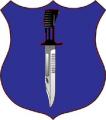Agreed on the strangely compelling nature of this thread. But if you do manage to break contact, remember the following TTP: "Leave the gun. Take the cannoli."
Given your points, as well as Schmedlap's and Bill Moore's anecdote(s) about the messages implicit in making a big bang to impress the locals, I come around to the old "chicken-and-egg" dilemma of "when is a lesson 'learned' at the institutional level"?
In my thinking, doctrine (and the definitions therein) represents an attempt to institutionalize thought, to give it a theoretical framework and structure that should--even as it (slowly) changes and evolves over time--still outlast whatever specific conditions and commanders are present in a given time and place.
Ultimately, isn't doctrine the way we make sure the next guys and gals to walk in our boots continue to focus on the right things, beyond "simple" TTP and lessons? And, if so, doesn't the issue of how to synthesize the various components of IO remain an organizational imperative, rather than become a thought-experiment that has run its useful course?












 Just a guess but would make sense to me since most seem to want to put it in the Op's and above category.
Just a guess but would make sense to me since most seem to want to put it in the Op's and above category.




Bookmarks